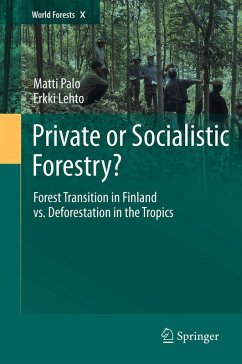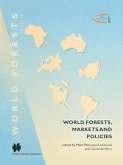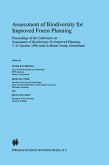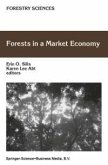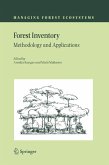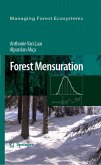While deforestation continues at an alarming rate around the world, discussions on the range of underlying causes continue. The premise is that studying successful transitions from deforestation to sustainable forestry ex post in Finland can provide novel insights into how deforestation in the tropics might be reduced in the future. Our fundamental question here is why Finland succeeded to stop deforestation for a century ago and why not the same is feasible in the contemporary tropical countries?
This book presents a novel integrated theory within which this case study on Finland and contemporary modeling of underlying causes of tropical deforestation are developed. Finland remains the world's second largest net exporter of forest products, while maintaining the highest forest cover in Europe. A transition from deforestation to sustainable industrial forestry took place in Finland during the first part of the 20th century. The underlying causes of this transition are compared via our theory with deforestation in 74 contemporary tropical countries. Both appear similar and support our theory.
The interaction of public policies and market institutions has appeared to be critical during this transition. The study's findings suggest that private forest ownership with a continuous increase in the real value of forests and alleviation of poverty under non-corruptive conditions has been a necessary, but not a sufficient, condition for this transition. In a parallel way public policies have also proved to be a necessary, but not sufficient, condition in this transition.
The conclusion is that socialistic forestry along with corruption is artificially maintaining too low values in the tropical forests. The opportunity cost of sustainable forestry remains too high and deforestation by extensification of agriculture therefore continues. The prevailing socialistic forestry with dominating public forest ownership is by purpose maintaining administratively set low stumpage prices leading to low value of forests, wide corruption and continuous forest degradation and deforestation. An effective remedy - to raise the value of forests - is found to be within forestry.
This book presents a novel integrated theory within which this case study on Finland and contemporary modeling of underlying causes of tropical deforestation are developed. Finland remains the world's second largest net exporter of forest products, while maintaining the highest forest cover in Europe. A transition from deforestation to sustainable industrial forestry took place in Finland during the first part of the 20th century. The underlying causes of this transition are compared via our theory with deforestation in 74 contemporary tropical countries. Both appear similar and support our theory.
The interaction of public policies and market institutions has appeared to be critical during this transition. The study's findings suggest that private forest ownership with a continuous increase in the real value of forests and alleviation of poverty under non-corruptive conditions has been a necessary, but not a sufficient, condition for this transition. In a parallel way public policies have also proved to be a necessary, but not sufficient, condition in this transition.
The conclusion is that socialistic forestry along with corruption is artificially maintaining too low values in the tropical forests. The opportunity cost of sustainable forestry remains too high and deforestation by extensification of agriculture therefore continues. The prevailing socialistic forestry with dominating public forest ownership is by purpose maintaining administratively set low stumpage prices leading to low value of forests, wide corruption and continuous forest degradation and deforestation. An effective remedy - to raise the value of forests - is found to be within forestry.
Dieser Download kann aus rechtlichen Gründen nur mit Rechnungsadresse in A, B, BG, CY, CZ, D, DK, EW, E, FIN, F, GR, HR, H, IRL, I, LT, L, LR, M, NL, PL, P, R, S, SLO, SK ausgeliefert werden.
From the reviews:
"The text examines why Finland has been successful in curbing deforestation and compares the processes with those taking place in the tropics. ... The text is easy to read and very well written and organized. Each section contains a good introduction and conclusion. ... This book is an excellent guide for those seeking to combat deforestation and should be a boon to those who want a model to follow especially at the national level." (H. Gyde Lund, Amazon, June, 2012)
"The purpose of the book is to present a 'universal forest transition theory' and to apply this theory ex post (looking back) to forest transition in Finland during the past hundred years and ex ante (looking ahead) to contemporary tropical deforestation. ... The book, which contains a wealth of experience, useful data and references to related scientific studies, is considered indispensible for graduate students of political science, international forestry, geography, environment science and related fields. ... It should be available in all relevant research libraries." (Klaus von Gadow, Forstarchiv, Vol. 83 (5), 2012)
"The text examines why Finland has been successful in curbing deforestation and compares the processes with those taking place in the tropics. ... The text is easy to read and very well written and organized. Each section contains a good introduction and conclusion. ... This book is an excellent guide for those seeking to combat deforestation and should be a boon to those who want a model to follow especially at the national level." (H. Gyde Lund, Amazon, June, 2012)
"The purpose of the book is to present a 'universal forest transition theory' and to apply this theory ex post (looking back) to forest transition in Finland during the past hundred years and ex ante (looking ahead) to contemporary tropical deforestation. ... The book, which contains a wealth of experience, useful data and references to related scientific studies, is considered indispensible for graduate students of political science, international forestry, geography, environment science and related fields. ... It should be available in all relevant research libraries." (Klaus von Gadow, Forstarchiv, Vol. 83 (5), 2012)

